TweetShare
Acupuncture reduces pain and improves sleep for fibromyalgia patients. Researchers determined that “acupuncture is an effective form of treatment for individuals with fibromyalgia” in a meta-analysis of eleven studies. The investigators add that additional research can help to “enhance and extend the effective therapeutic use of acupuncture in the treatment of fibromyalgia.”
Fibromyalgia is a condition characterized by widespread pain, heightened sensitivity to pain upon pressure, exhaustion, insomnia and aching joints. Other symptoms include digestive complaints, numbness, tingling, headaches, anxiety and impaired cognition. The overall presentation of fibromyalgia is pain throughout the body and tenderness.
The researchers cited studies finding acupuncture effective for reducing pain at tender points. Overall quality of life scores improved with acupuncture including significant reductions in sleep disturbances. Patients receiving acupuncture treatments also demonstrated lower rates of relapses and significant reductions in analgesic medication dependence.
 One of the studies in the meta-analysis used CT scans on the acupuncture patients treated for fibromyalgia. The CT scans revealed “increased u-opioid receptors” involved in the reduction of referred pain as a result of acupuncture treatments. The u-opioid receptors are a class of opioid receptors with an affinity for enkephalins and beta-endorphins. Activation of u-opioid receptors causes pain reduction and sedation. Another study in the scientific review found electroacupuncture especially helpful in reducing pain levels.
One of the studies in the meta-analysis used CT scans on the acupuncture patients treated for fibromyalgia. The CT scans revealed “increased u-opioid receptors” involved in the reduction of referred pain as a result of acupuncture treatments. The u-opioid receptors are a class of opioid receptors with an affinity for enkephalins and beta-endorphins. Activation of u-opioid receptors causes pain reduction and sedation. Another study in the scientific review found electroacupuncture especially helpful in reducing pain levels.
One study in the meta-analysis emphasized the importance of Traditional Chinese Medicine (TCM) differential diagnostics. Mist et. al., examined a group of women diagnosed with fibromyalgia and further differentiated the disorder into TCM diagnostics: deficiency of qi and blood, stagnation of qi and blood, stagnation of liver qi. Mist et. al., concluded that TCM diagnostics can be used in conjunction with scientific investigations to “form more homogeneous groups” thereby improving the accuracy of findings. The meta-analysis also demonstrates that acupuncture is effective as a standalone treatment modality or as an adjunct modality to other forms of medical care.
Prior research published in Clinical Rheumatology concurs citing that acupuncture therapy provides “beneficial effects” for the treatment of fibromyalgia. Researchers from the University of Maryland School of Medicine (Baltimore) also concur and conclude that “real acupuncture is more effective than sham acupuncture for improving symptoms of patients with FMS (fibromyalgia).” In another study published by the Department of Anesthesiology at the Mayo Clinic College of Medicine (Rochester, Minnesota) researchers conclude, “We found that acupuncture significantly improved symptoms of fibromyalgia. Symptomatic improvement was not restricted to pain relief and was most significant for fatigue and anxiety.”
Excerpt from:







